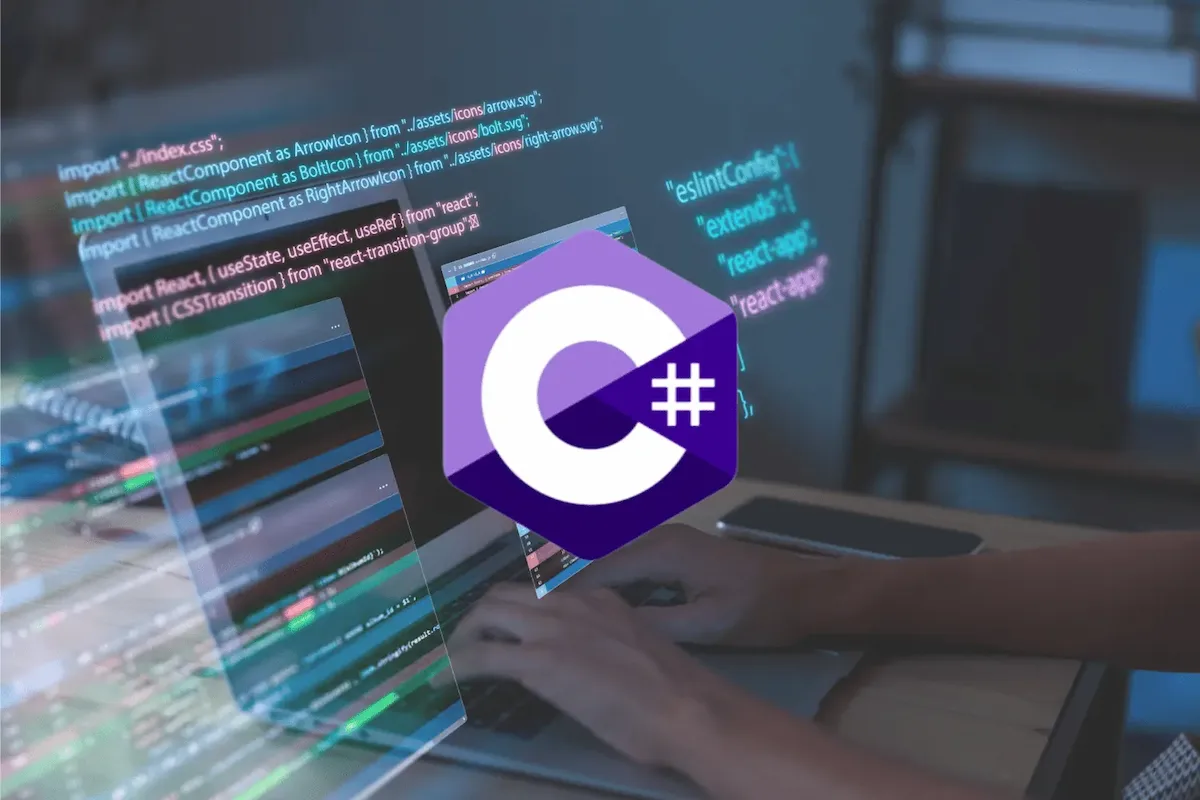C# is a young and powerful language that has consistently ranked among the top 5 globally for years,according to the TIOBE Index. Originally designed to compete with Java, C# has become a powerful tool for programming. Its ability to cater to a wide range of applications—from web development and desktop software to mobile apps and game development—makes it a favorite among developers.
Companies like Accenture, Siemens, and Hewlett Packard Enterprise (HPE) rely on C# for their software development needs. The reason? C# offers unparalleled versatility, enabling businesses to build tailored solutions across diverse industries. Its object-oriented nature ensures that code is modular, maintainable, and reusable, contributing to efficient and effective software development.
In this guide from Jalasoft, a firm leader in staff augmentationwith a pool of C# experts, we'll delve into the core concepts and advantages of this popular object-oriented programming language. Join us as we explore what makes C# an essential tool in the modern developer's toolkit.
What Is C#?
C# (C-sharp) is a modern, object-oriented programming language developed by Microsoft as part of its .NET initiative. Launched in 2000, C# has become one of the most popular programming languages for building a wide range of applications, from web and mobile apps to games and enterprise software.
C# was designed by Anders Hejlsberg and his team at Microsoft. It was intended to combine the computing power of C++ with the ease of use of Visual Basic, positioning itself as a language that would support the rapid development of robust and durable applications. Developers can usually compare it favorably to languages like Java, offering similar functionality, such as synchronized method calls and support for strongly typed function pointers.
Over the years, C# has evolved significantly, with each new version introducing enhancements and new features, including the announcement of C# open source in 2014. For instance, C# 2.0 introduced generics, anonymous methods, and iterators, while later versions brought in LINQ (Language Integrated Query), asynchronous programming features (async/await), and advanced pattern matching, among other capabilities.

Relationship Between C# and the .NET Framework
C# is closely linked with the .NET ecosystem, serving as its primary language for application development. Designed specifically for .NET, C# enables developers to harness the platform's full capabilities. With access to extensive class libraries, C# facilitates a broad spectrum of functionalities, including file handling, database connectivity, cryptography, and network communication, ensuring robust and feature-rich applications.
The .NET Framework is a software framework developed by Microsoft that runs primarily on Microsoft Windows. It includes a large class library called the Framework Class Library (FCL) and provides language interoperability across several programming languages. Programs written for the .NET Framework execute in a software environment known as the Common Language Runtime (CLR), an application virtual machine that provides services such as security, memory management, and exception handling.
However, due to updates related to Open Source, C# is also known for its flexibility and comprehensive libraries that allow for work across different operating systems.
The transition from .NET Framework to .NET Core and .NET 5+
Over time, the .NET ecosystem has evolved to address the changing needs of developers and the industry. This evolution has led to the transition from the traditional .NET Framework to the more modern .NET Core, and eventually to the unified .NET 5 and beyond.
.NET Framework:
Initially released in 2002, the .NET Framework was primarily designed for building Windows applications. It provided a robust and comprehensive development platform but was limited to the Windows operating system, which restricted its adoption in cross-platform environments.
.NET Core:
Introduced in 2016, .NET Core was developed to address the limitations of the .NET Framework. It is a cross-platform, high-performance, and open-source framework that allows developers to build applications that run on Windows, Linux, and macOS. .NET Core brought modularity and flexibility, enabling developers to use only the necessary components, which improved performance and reduced overhead.
.NET 5+:
In 2020, Microsoft released .NET 5, which marked the beginning of a unified platform that consolidated the capabilities of .NET Framework, .NET Core, and Xamarin (used for mobile app development). The goal of .NET 5 and subsequent versions (like .NET 6 and .NET 7) is to provide a single platform that supports all types of applications, including web, mobile, desktop, cloud, gaming, and IoT.
Benefits of the Unified .NET Platform:
The unified .NET platform offers several benefits to developers. Firstly, it ensures cross-platform consistency, enabling the creation of applications that run seamlessly across multiple platforms using a single codebase. Secondly, enhancements in the runtime and libraries contribute to improved performance and lower resource consumption, optimizing the efficiency of applications. Additionally, the unified platform simplifies development by reducing complexity, making it easier for developers to learn and transition between different types of projects. Lastly, the platform's open-source nature fosters a vibrant community of contributors who actively participate in the development and enhancement of the framework, driving innovation and collaboration within the ecosystem.

Open-Source Nature
C# and the .NET platform have significantly embraced the open-source movement, transforming the way developers interact with and contribute to these technologies. The decision to open source both C# and .NET has fostered greater transparency, collaboration, and innovation within the developer community.
In 2014, Microsoft open-sourced the C# compiler platform known as Roslyn. This move allowed developers to see the inner workings of the C# compiler, contribute to its development, and even extend its capabilities. The Roslyn project, hosted on GitHub, has since become a collaborative hub where developers can suggest and implement new language features and improvements.
Following the success of open-sourcing Roslyn, Microsoft took a significant step by open-sourcing the .NET Core runtime and framework libraries. This move allowed .NET Core to be adopted widely across different platforms, including Linux and macOS, breaking its traditional Windows-only constraint.
.NET 5 and later versions, which unify the .NET ecosystem, continue to be open-source, ensuring that the entire development platform remains accessible and collaborative. The source code for these frameworks is available on GitHub, where the community can report issues, contribute code, and participate in discussions about future directions.
Influence on the Community and Development Practices
These open-source projects have had a profound impact on the developer community and development practices:
Community Collaboration:
Open-source projects like Roslyn, ASP.NET Core, and Xamarin.Forms have fostered collaboration among developers worldwide. Contributions from the community have led to bug fixes, performance improvements, and the addition of new features, enhancing the overall quality and functionality of these projects.
Knowledge Sharing:
By providing access to the source code and encouraging contributions, these projects have facilitated knowledge-sharing and learning opportunities for developers. Contributors gain insights into best practices, coding standards, and software design principles, which they can apply to their own projects.
Innovation and Adaptability:
The open-source nature of these projects promotes innovation and adaptability. Developers can experiment with new ideas, explore cutting-edge technologies, and tailor the software to meet specific requirements. This flexibility drives continuous improvement and keeps the projects relevant in a rapidly evolving landscape.
Contributing to Open-Source
Contributing to open-source projects is one of the most rewarding experiences a developer can have, and C# offers a wealth of opportunities in this vibrant community. Open source is more than just code; it's about collaboration, innovation, and continuous learning. By contributing to open-source C# projects, developers can not only improve their coding skills but also help shape the tools and frameworks used by millions worldwide.
To contribute to open-source C# projects, start by finding a project that interests you on platforms like GitHub. Set up your development environment with tools like Visual Studio. Read the project’s documentation to understand its goals and guidelines. Identify issues labeled as beginner-friendly and pick one to work on. Fork the repository, create a new branch, and make your changes, ensuring your code is clean and well-documented. Commit your changes and push them to your forked repository. Finally, submit a pull request to the original repository, clearly describing your changes, and engage in the review process by responding to feedback and making necessary revisions. Engaging with the community through forums and discussions can also enhance your contributions and learning experience.
Here are some of the numerous benefits:
Learning Opportunities:
Contributing to open-source projects exposes developers to real-world codebases and challenges, providing valuable learning opportunities. They can learn from experienced contributors, receive feedback on their code, and gain insights into industry best practices.
Networking and Collaboration:
Engaging with the open-source community allows developers to network with like-minded individuals, establish connections with industry professionals, and collaborate on meaningful projects. This networking can lead to career opportunities, mentorship, and personal growth.
Improving Coding Skills:
Contributing to open-source projects helps developers improve their coding skills, including programming proficiency, problem-solving abilities, and code quality. They learn to write clean, maintainable code, adhere to coding standards, and work effectively in a team environment.
Tools and Libraries
The C# ecosystem offers a variety of tools and libraries that facilitate open-source development:
NuGet:
NuGet is a package manager for .NET that simplifies the process of finding, installing, and managing dependencies in C# projects. It provides developers with access to a vast repository of packages, including libraries, frameworks, and tools, which they can use to accelerate their development workflows.
Entity Framework:
Entity Framework is an open-source object-relational mapping (ORM) framework for .NET that enables developers to work with relational databases using C# objects. It abstracts away the complexity of database interactions, allowing developers to focus on writing application logic rather than SQL queries.
Visual Studio Code:
Visual Studio Code (VS Code) is a lightweight, open-source code editor that supports C# development. It offers features like IntelliSense, debugging, and version control integration, making it a popular choice among C# developers for writing, testing, and debugging code in various environments.
These tools and libraries streamline the development process, improve productivity, and enhance the overall quality of open-source C# projects.

Key Features of C#
Object-Oriented Programming (OOP): C# is inherently object-oriented, which means it focuses on objects and classes. This allows for modular, maintainable, and reusable code. Core principles of OOP—such as encapsulation, inheritance, and polymorphism—are integral to C#.
Type Safety: C# is a strongly typed language. This means that type errors are caught at compile-time rather than at runtime, reducing bugs and making the code more reliable and easier to debug.
Rich Library Ecosystem: C# is supported by the extensive .NET Framework (and its cross-platform successor, .NET Core/.NET 5+), which provides a vast library of pre-built classes and methods to handle common programming tasks, such as file reading and writing, data manipulation, and web service interactions.
Modern Language Features: C# consistently incorporates modern programming features, such as:
- LINQ (Language Integrated Query): Allows querying of data collections using a SQL-like syntax.
- Asynchronous Programming: Simplifies writing asynchronous code using the async and await keywords.
- Pattern Matching: Enhances control flow with more expressive and readable code.
Cross-Platform Development: With the advent of .NET Core and its evolution into .NET 5 and beyond, C# enables developers to build applications that run on Windows, Linux, and macOS. Xamarin extends this capability to mobile platforms, allowing for the development of iOS and Android applications using C#.
OOP Concepts
Object-oriented programming (OOP) is a fundamental paradigm in C# that organizes software design around data or objects rather than functions and logic. C# leverages OOP to promote modular, maintainable, and reusable code. Some of the core OOP concepts in C# are:
Encapsulation
Encapsulation is bundling data (fields) and methods (functions) that operate on the data into a single unit or class. It restricts direct access to some of an object's components, preventing accidental interference and misuse of the data.
Inheritance
It’s a mechanism where one class (derived class) inherits the properties and methods of another class (base class). This allows for code reuse and creating a hierarchical relationship between classes.
Polymorphism
This allows methods to do different things based on the object it is acting upon, even though they share the same name. This can be achieved through method overriding and method overloading.
Abstraction
Abstraction involves hiding the complex implementation details and showing only the essential features of the object. It allows one to focus on what an object does rather than how it does it.
How to learn C#?
C# is an excellent language to learn, offering a robust foundation for programming. However, the key to becoming a successful programmer lies not just in mastering a language but in developing strong concepts and problem-solving skills. Here’s a guide to help you get started with C# and build a solid programming foundation.
Focus on Fundamental Concepts
To truly excel in programming, focus on understanding core concepts and developing problem-solving abilities. Here are the essential areas you need to master:
Variables:
Learn how to declare and use variables in C#. Understand different data types (integers, floats, strings, etc.) and how to manipulate them.Pass by Value and Pass by Reference:
Understand the difference between passing parameters by value and by reference. This is crucial for controlling how data is accessed and modified within functions.Functions:
Master the creation and use of functions (methods) in C#. Learn about return types, parameters, and how to call functions.Control Statements:
Get comfortable with control statements such as if/else, switch, and loops (for, while, do-while). These constructs are essential for directing the flow of your programs.Recursion:
Understand recursion, the concept of functions calling themselves. This is a powerful tool for solving complex problems by breaking them down into simpler sub-problems.Data Structures:
Develop a solid grasp of fundamental data structures like arrays, lists, stacks, queues, trees, maps, graphs, and hash tables. Knowing how to efficiently store and manipulate data is critical for effective programming.
Practical Tips for Learning C#
Start with Tutorials and Books:
Begin with beginner-friendly tutorials and books that introduce C# syntax and basic programming concepts. Resources like "C# Programming Yellow Book" by Rob Miles can be very helpful.
Practice, Practice, Practice:
Apply what you learn by writing small programs and gradually increasing their complexity. Practice is key to reinforcing your understanding and improving your coding skills.
Build Projects:
Work on projects that interest you. Whether it’s a simple calculator, a to-do list app, or a small game, projects help you apply your knowledge in real-world scenarios.
Join Coding Communities:
Engage with online communities like Stack Overflow, Reddit’s r/csharp, or local meetups. These platforms provide support, feedback, and opportunities to learn from experienced developers.
Take Online Courses:
Platforms like Coursera, Udemy, and Pluralsight offer comprehensive courses on C# and software development. These can provide structured learning paths and hands-on exercises.
Contribute to Open Source:
Contributing to open-source projects can provide practical experience and expose you to real-world codebases. It’s a great way to learn best practices and collaborate with other developers. In fact, many developers who gain hands-on experience this way later join professional teams through models like staff augmentation, where companies integrate external C# talent into their development workflows.

Unleashing Your C# and .NET Potential with Jalasoft
In conclusion, C# stands as a formidable language within the programming landscape, consistently ranking among the top contenders globally. Originally envisioned to rival Java, it has since become a versatile tool cherished by developers across various domains.
From its inception to its evolution alongside the .NET framework, C# has continually adapted to meet the changing demands of developers and industry standards: from .NET Framework to .NET Core and now to the unified .NET 5+ platform, Microsoft exemplifies their commitment to modern, flexible, and cross-platform development.
As C# and the .NET ecosystem continue to evolve, they remain at the forefront of innovation, empowering developers worldwide to build robust, scalable, and cutting-edge applications. Today, many organizations accelerate their development processes by integrating staff augmentation into their workflows, allowing them to tap into specialized C# talent without the long-term overhead of full-time hires.
Through this guide that leverages Jalasoft's expertise and pool of C# experts, developers gain insights into the language's core concepts and advantages, empowering them to navigate the software development field.
Whether you're embarking on your journey to learn C# or seeking to advance your skills, the future holds boundless opportunities for exploration, collaboration, and growth within the vibrant C# community.
